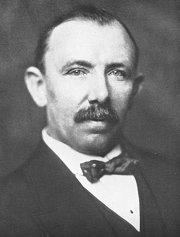
Jimmy Thomas was a powerful influence in the NUR for at least two decades when women's employment on railways was growing. Born James Thomas in Newport in 1874, he left school aged 12 and worked as an errand boy for a chemist. At 15 he became an engine cleaner on the GWR. Three years later he passed his fireman's exams and began work at a colliery in the Sirhowy Valley. Here, Thomas joined the ASRS, eventually becoming a full-time organiser and remaining so when it became the NUR. He joined the newly formed Labour Party and was elected as a Councillor for Swindon.
In 1909 the Derby Trades Council became unhappy with the performance of Richard Bell, a former guard and an NUR-sponsored MP. He and the local Labour Party invited Thomas to be the new candidate. He accepted and in his election address called for an increase in taxes on the rich and the abolition of the House of Lords. At the 1910 General Election Thomas received 10,239 votes, over 2,000 more than the Conservative Party candidate.
While serving as MP for Derby, Thomas retained his position in the union and helped to organise a strike in 1911. He was elected General Secretary of the NUR in 1917 and two years later led another successful railway strike. When Labour came to power in 1923 Thomas was appointed Secretary of State for the Colonies. Before the General Strike of 1926, Thomas was asked by the TUC to negotiate with the (by then Conservative) government to avert the strike but the talks proved abortive.
When Labour won the 1929 General Election, Thomas became Lord Privy Seal. It was a time of economic depression and the Chancellor of the Exchequer wanted to reduce unemployment benefit. Several ministers refused to accept the cuts and resigned. The Prime Minister, Ramsay MacDonald, angry that his Cabinet had voted against him, also resigned. He was later persuaded to head a new coalition government that would include Conservative and Liberal leaders. Most of the Labour Cabinet rejected this; Jimmy Thomas was one of only three who agreed to join the new government, serving as MP for Derby, and Secretary for the Colonies. When the coalition government introduced the measures that had caused all the trouble, Labour MPs were furious and Thomas and the other two MPs who had joined the coalition were expelled from the Labour Party. Thomas was then obliged to resign from the NUR,
Jimmy Thomas held his government post until May 1936, when he was found guilty by a Tribunal of Inquiry of leaking budget secrets to his stockbroker son Leslie; to Sir Alfred Butt, the Conservative MP for Balham and Tooting; and to Alfred 'Cosher' Bates, a wealthy businessman. In a Judicial Tribunal, Bates admitted giving Thomas £15,000 but tried to claim it was an advance for a proposed autobiography. Thomas was forced to resign from the government and left the House of Commons with his head bowed in shame.
Jimmy Thomas retired to his home, Millbury House, Ferring, near Worthing, where he wrote his autobiography, My Story (1937). He died in 1949.
Order the book "Railway Women"
HOME